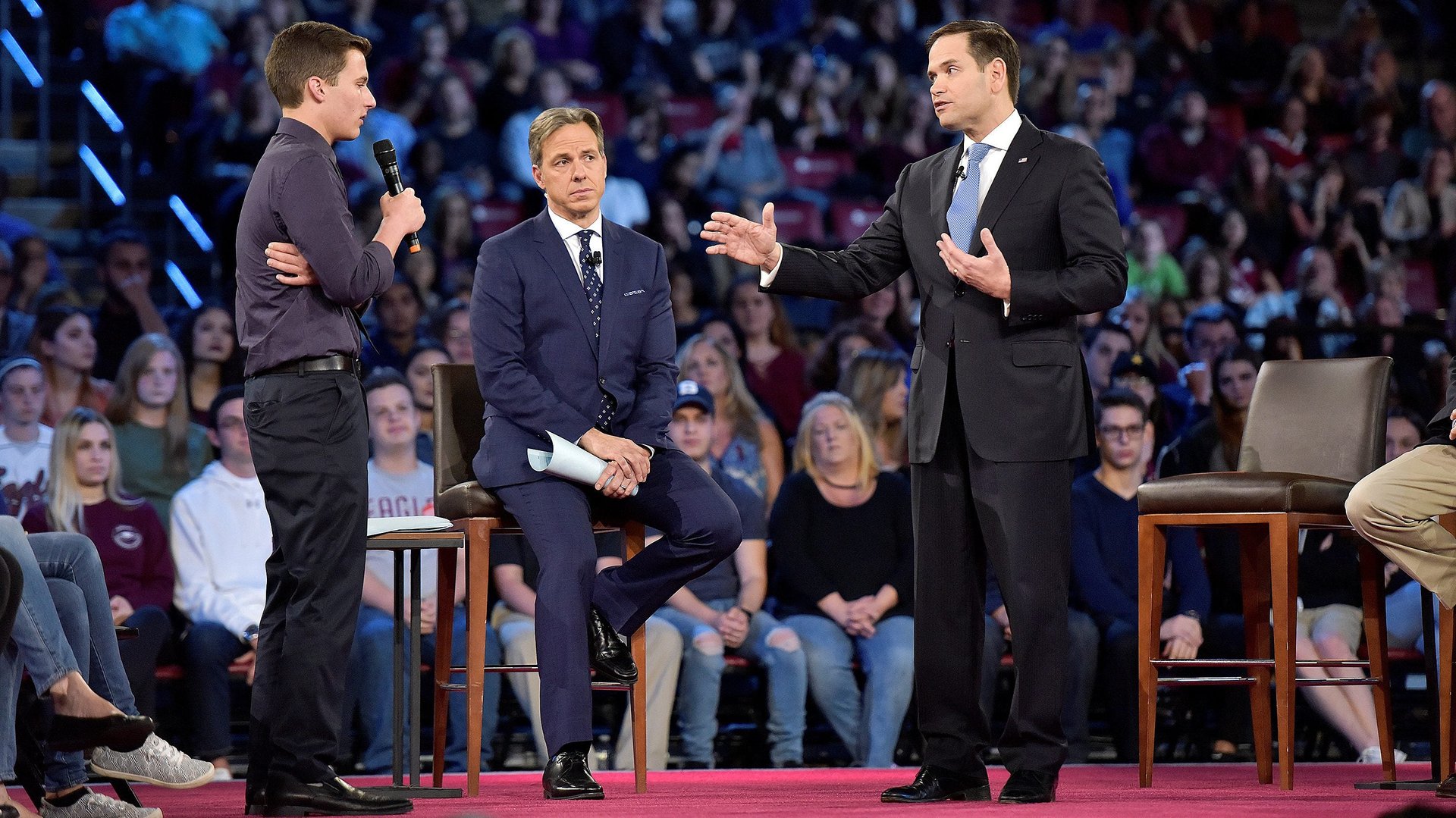CNN’s town hall on gun violence was unlike anything that’s ever been on TV
An American teenager asked a US senator directly to his face if he’d stop accepting money from the National Rifle Association after the latest horrific school shooting. The senator waffled, so the young man asked the question again, and again, until eventually the senator provided a tepid half-answer.


An American teenager asked a US senator directly to his face if he’d stop accepting money from the National Rifle Association after the latest horrific school shooting. The senator waffled, so the young man asked the question again, and again, until eventually the senator provided a tepid half-answer.
The audience of 7,000, and the millions more watching the exchange live on TV, had seen everything they needed to see: a dramatic, telling, vital example of American democracy, broadcast in realtime for the world.
The student was Cameron Kasky, a 17-year-old student at Marjory Stoneman Douglas High School in Parkland, Florida, who survived the mass shooting that killed 17 of his classmates and teachers last week. The senator, Republican Marco Rubio—along with two Democratic Florida lawmakers, senator Bill Nelson and representative Ted Deutch—took part in a town hall about gun violence with students, parents, and teachers from the Parkland community. CNN anchor Jake Tapper moderated.
American politicians holding town halls with constituents isn’t anything new. Normally, though, they’re not aired on live national television. Nor do they typically involve students, especially not ones who had just experienced a tragedy and had since devoted seemingly every waking minute to calling for more gun control to prevent the next one.
Kasky’s question to Rubio—the beneficiary of more than $3 million in NRA spending (paywall)—was asked in a way only a righteous, unabashed young person could ask it. He didn’t allow the senator to escape without answering the question, as even a seasoned TV moderator might have. Rubio’s canned response (“People buy into my agenda”) didn’t work on Kasky.
The questions kept coming. Fred Guttenberg, whose 14-year-old daughter Jaime was killed in the Parkland shooting, told Rubio that his initial comments, and those of Donald Trump, were “pathetically weak.” He then asked Rubio what he, specifically, planned to do about the gun problem in America.
One of the more remarkable exchanges came later on, when Rubio appeared to concede that, as a direct result of conversations he had on this night and in days prior, he was “reconsidering” his position on limiting the size of gun-magazine stocks Americans are allowed to use. “I traditionally have not supported looking at magazine clip size, and after this and some of the details I learned about it, I’m reconsidering that position,” Rubio said. “It may save lives in an attack,” he acknowledged.
Sitting US senators rarely, if ever, admit that their views on a position are changing. That these students—and this event—were able to move Rubio in a new direction is no small feat.
After Rubio, Nelson, and Deutch left the stage, NRA spokeswoman Dana Loesch entered, and the town hall turned into an exercise in catharsis for many. Students and teachers asked pointed questions of Loesch, and while she deflected and evaded as only a practiced public-relations hand equipped with talking points knows how, the exchanges made for extremely compelling television.
The images of 18-year-old Parkland survivor Emma Gonzalez facing Loesch and asking about the NRA’s position on legal modifications to semi-automatic weapons, or of history teacher Diane Wolk Rogers prompting Loesch to define for the audience “a well-regulated militia” as written in the US constitution, were indelible, and may prove to be crucial reference points for the fight against gun violence in America.
Loesch, who’s known for her histrionic, fear-mongering publicity videos, was unsurprisingly disingenuous in her responses. She said the “crazy” Parkland shooter should have never gotten his hands on a weapon, despite the fact that the NRA fights the kind of legislation that would do so every change it gets. In response to Rogers’ view that the country’s founders were talking about muskets when they sought to guarantee the right to bear arms, Loesch claimed that fully automatic weapons existed when the law was adopted in 1791. (They didn’t.)
The NRA, a lobbying organization that purports to represent gun owners but, in practice, advocates more on the behalf of gun manufacturers, is considered perhaps the biggest obstacle to common-sense gun reform in the US. Even if Loesch didn’t flounder quite as much as Rubio did, the contrast between her and the grieving Parkland community was stark, a visibile metaphor only live television can render.
Because of the courage of these Parkland students, the gun-violence debate isn’t going away as it typically does shortly after US mass shootings. And because of CNN’s live town hall, it was thrust into the living rooms of millions of Americans for them to see the unfiltered stakes of the debate—the survivors and the victims’ families confronting the lawmakers and lobbyists who bear some responsibility for their suffering.
There’s never been anything on American television like it.